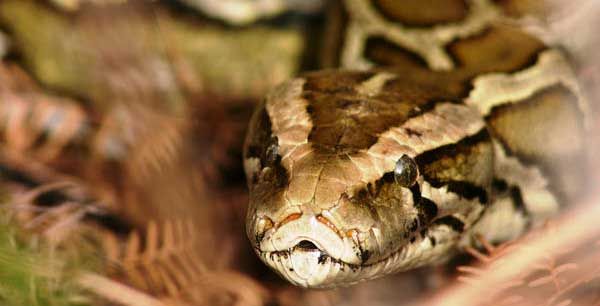
Time
was you could buy a Burmese python in Florida, but the cute little
snakes sold at carnivals eventually became 20-foot-long eating machines,
so a lot of them were freed into the Everglades. Now they are an
invasive species that has all but wiped out rabbits, raccoons, bobcats,
and other small mammals from the park. It has been estimated that there
are around 100,000 Burmese pythons in Florida -a place where they do not
naturally exist. In 2008, the Nature Conservancy began training
citizens to spot and report pythons, and training wildlife professionals
to capture them. This is
the Python Patrol.
The
Python Patrol program has since trained more than 450 responders and
2,625 detectors, including field scientists, state wildlife commission
staff, state park service personnel, utility workers for the city of
Miami—anyone likely to encounter non-native snakes in the field—and even
a group of war veterans known as the Swamp Apes. One trainee,
70-year-old Eric Raits, has now caught three pythons while working as a
tour guide at Shark Valley Tram Tours in Everglades. Once, lacking a bag
into which to deposit the snake, he simply held on to the 9-foot python
for the remaining half of the two-hour tour. “I was sitting in the
backwards-facing seat with the snake coiled up around my arm,” he says.
“Unsurprisingly, no one sat in the two rows closest to me. They were all
in the back, sitting on each other’s laps.”
The aim
of the Python Patrol is to limit the spread of the pythons, so
scientists are still working on the problem of eradicating them. But the
program has had some success, and the volunteers are also being trained
in spotting other invasive species that threaten Florida’s ecology.
Read about Florida’s invasive species problem and the Python Patrol’s
efforts
at The Nature Conservancy.
 Time
was you could buy a Burmese python in Florida, but the cute little
snakes sold at carnivals eventually became 20-foot-long eating machines,
so a lot of them were freed into the Everglades. Now they are an
invasive species that has all but wiped out rabbits, raccoons, bobcats,
and other small mammals from the park. It has been estimated that there
are around 100,000 Burmese pythons in Florida -a place where they do not
naturally exist. In 2008, the Nature Conservancy began training
citizens to spot and report pythons, and training wildlife professionals
to capture them. This is the Python Patrol.
Time
was you could buy a Burmese python in Florida, but the cute little
snakes sold at carnivals eventually became 20-foot-long eating machines,
so a lot of them were freed into the Everglades. Now they are an
invasive species that has all but wiped out rabbits, raccoons, bobcats,
and other small mammals from the park. It has been estimated that there
are around 100,000 Burmese pythons in Florida -a place where they do not
naturally exist. In 2008, the Nature Conservancy began training
citizens to spot and report pythons, and training wildlife professionals
to capture them. This is the Python Patrol.
No comments:
Post a Comment